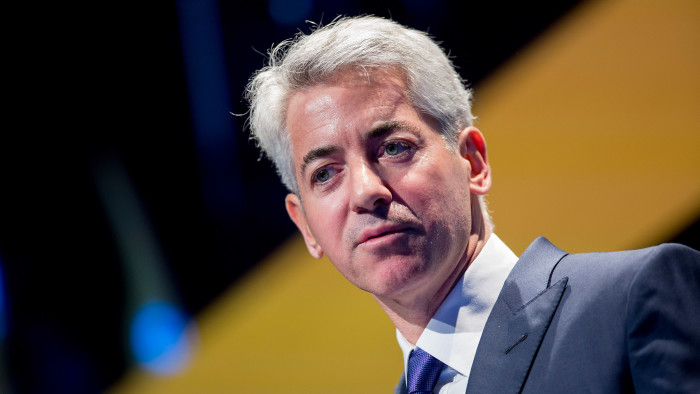Activists’ battles with companies played out in the classroom

Roula Khalaf, Editor of the FT, selects her favourite stories in this weekly newsletter.
Activist hedge funds have spent the past half-decade disrupting blue-chip companies — winning board seats, bringing down chief executives and dictating corporate strategy. Now their actions are shaking up the way some financial courses are taught.
The exploits of high-profile activist fund managers, such as Carl Icahn and Bill Ackman, have inspired a new generation of would-be investors who are keen to know how activists identify suitable targets and carry out their campaigns.
“I think it’s essential to learn about activism,” says Niklas Schmuecker, who is undertaking a finance MBA at New York City’s Columbia Business School. “If you end up in investment management you need to know how activists work and how their actions could affect your investments.
“If you end up in a corporation you’ll need to know how to defend the company from activist attacks. There are many potential careers where what I learnt will be helpful.”
Activist investors buy small stakes in companies — typically 5-10 per cent of their stock — and then use their position as a minor shareholder to pressure the companies to make changes. In many situations, such as at Microsoft and Yahoo, activists have won board seats, while at others they have forced their targets to buy rivals, sell business lines and change how they allocate capital.
Between 2009 and 2015, more than 40 per cent of the 500 largest US listed companies were subject to activist scrutiny, with 15 per cent facing such investors in a public stand-off, according to data provider FactSet.
Mr Schmuecker took a new course offered by Columbia this spring that focused on activists. Students were given a potted history of shareholder activism, were taught about hedge fund tactics and discussed the controversies that surround their strategies.
Students heard talks by guest speakers including Jeffrey Smith — an activist investor at Starboard Value who joined the Yahoo board in April — as well as lawyers and investment bankers who help companies defend themselves against activist campaigns.
Wei Jiang, the Columbia professor who designed and ran the course, says she decided to focus on activist investing after receiving requests for more information on the strategy from students on her advanced corporate finance course.
“I don’t think that the majority of people who took my course actually wanted to become activists, but they understand that in their future jobs they will get into activist situations and they want to know about it,” she says. “They don’t feel that the traditional business school curriculum covers that.”
Separately, Columbia runs an annual competition in collaboration with hedge fund Pershing Square Capital. First- and second-year students on the school’s applied security analysis course are divided into around 40 teams and over three months they work to come up with an investment idea.
The teams are whittled down and the remaining five present their theses to a panel of judges, which is hosted by Mr Ackman, chief executive of Pershing Square, and includes several other hedge fund managers.
At Duke University’s Fuqua School of Business, finance professor Alon Brav is aptly restructuring his corporate restructuring course to make activist investors the unifying theme. He will use activist campaigns as case studies to teach his students about topics such as corporate governance, M&A, divestitures and leveraged buyouts.
Prof Brav, who along with Prof Jiang has studied the effects activists have had on the companies they target, plans to invite investors and consultants to speak to his students. “Using activism is a very easy way for students to understand these issues,” he says. “It’s a better way to tell stories as it brings [the issues] to life.”
He gives the example of teaching about public companies going private by discussing Mr Icahn’s ultimately unsuccessful attempts in 2013 to block Michael Dell from buying out the computer company he founded, Dell.
While the majority of activists are based in the US and focus on North American companies, European and Asian companies have also been targeted, by both US and domestic funds.
Julian Franks, finance professor at London Business School, has been teaching students about shareholder activism for the past eight years as part of his elective course on corporate restructuring. He says fewer than 10 per cent of his students are from the UK.
Students at the LBS course receive visits from current and former activist hedge fund executives, though Prof Franks doubts they view it solely as an opportunity to recruit graduates.
“I know of just one case where a hedge fund tried to recruit one of my students. But in the end they didn’t accept because the position was going to be based outside the UK,” he says. “Hedge funds are very small outfits, so they are probably not regular recruiters.”
Mr Schmuecker says what he found most valuable about taking the course was the ability to question investors such as Starboard’s Mr Smith about campaigns he was then involved in at Yahoo and pharmaceutical company Depomed.
“If you have one of the top activist investors presenting in class in front of you, it’s a lot more tangible than just talking about events in the news,” adds Mr Schmuecker.
Owen Walker’s new book on activist investors, ‘Barbarians in the Boardroom’, is published by FT Publishing
Comments